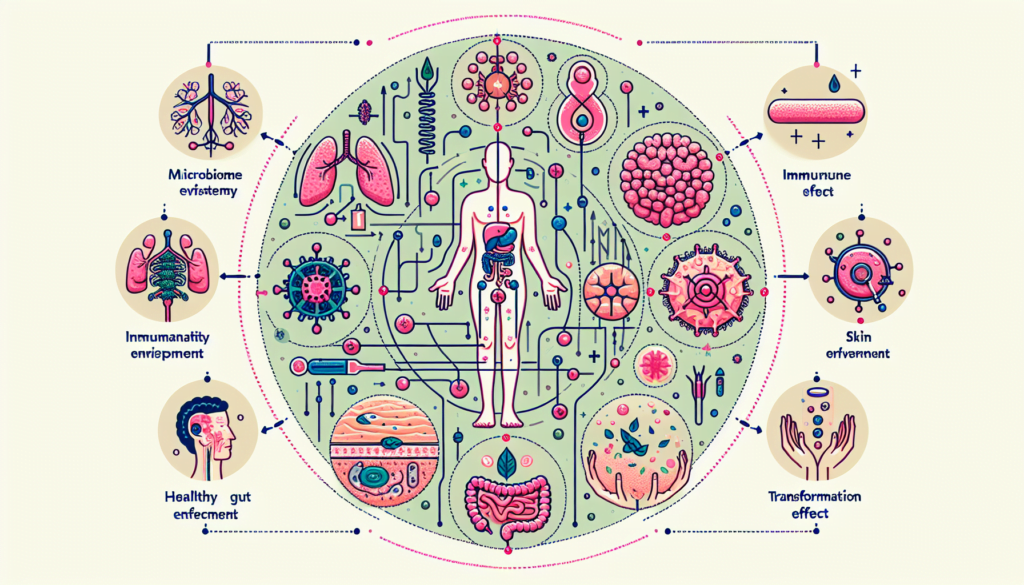Psoriasis is a chronic autoimmune disease that affects millions of individuals worldwide, causing uncomfortable and unsightly skin symptoms. But have you ever wondered about the connection between your gut and your skin? Well, it turns out that there is a fascinating relationship known as the gut-skin axis that plays a crucial role in the development and progression of psoriasis. In this article, we will explore the intricate link between your gut health and the state of your skin, shedding light on how a healthy gut can potentially lead to improved psoriasis symptoms. So, get ready to uncover the secrets of the gut-skin axis and discover the potential ways to promote a healthier you!
1. Overview of Psoriasis
Psoriasis is a chronic skin condition that affects millions of people across the world. It is characterized by red, scaly patches on the skin, often accompanied by itching and discomfort. Understanding the different aspects of psoriasis is crucial in order to develop effective treatment strategies and improve the quality of life for individuals living with this condition.
1.1 Definition
Psoriasis is a complex autoimmune disorder that primarily affects the skin. It is characterized by an overactive immune system that triggers rapid skin cell growth. This leads to the formation of plaques, which are thickened, scaly patches on the surface of the skin.
1.2 Prevalence
Psoriasis is a common condition, affecting approximately 2-3% of the global population. It can occur at any age, although it usually manifests between the ages of 15 and 35. Both men and women are equally susceptible to developing psoriasis.
1.3 Etiology
The exact cause of psoriasis is still unknown, although it is believed to be multifactorial. Genetic factors, environmental triggers, and immune system dysfunction all play a role in the development of this condition. People with a family history of psoriasis are more likely to develop the condition themselves.
1.4 Clinical Presentation
Psoriasis can present in various forms, including plaque psoriasis, guttate psoriasis, pustular psoriasis, and erythrodermic psoriasis. Plaque psoriasis is the most common form, characterized by raised, red patches with silvery scales. These patches often develop on the elbows, knees, scalp, and lower back.
2. Gut-Skin Axis
2.1 Introduction to Gut-Skin Axis
The gut-skin axis refers to the bidirectional communication between the gut and the skin. Emerging research suggests that the health of the gut microbiota, the community of microorganisms living in our intestines, plays a crucial role in the development and progression of various skin conditions, including psoriasis. This connection highlights the importance of maintaining a healthy gut for optimal skin health.
2.2 Gut Microbiota and Psoriasis
Studies have shown that individuals with psoriasis have an altered gut microbiota compared to healthy individuals. This dysbiosis is characterized by an imbalance in the types and abundance of bacteria in the gut. Specific bacterial strains, such as Streptococcus and Staphylococcus, have been found to be more prevalent in individuals with psoriasis.
2.3 Intestinal Permeability
Intestinal permeability, also known as “leaky gut,” refers to the increased passage of molecules from the intestines into the bloodstream. This can occur due to damage to the intestinal lining, allowing toxins and microbial products to leak into the bloodstream. Research has shown that individuals with psoriasis often have increased intestinal permeability, which may contribute to the development and exacerbation of this skin condition.
2.4 Role of Gut-Skin Axis in Psoriasis Development
The interaction between the gut microbiota, intestinal permeability, and the immune system plays a crucial role in the development of psoriasis. Dysbiosis and increased intestinal permeability can lead to systemic inflammation and immune system dysregulation, which can trigger and worsen psoriasis symptoms. Understanding these mechanisms is essential for developing targeted therapies that address the gut-skin axis in psoriasis treatment.

3. Gut-Skin Axis Interactions in Psoriasis
3.1 Dysbiosis and Psoriasis
Dysbiosis in the gut microbiota can contribute to the development and progression of psoriasis. Research has shown that specific bacterial strains, such as Streptococcus and Staphylococcus, are more prevalent in individuals with psoriasis. These bacteria produce inflammatory molecules that can stimulate immune system responses and trigger the development of psoriatic plaques.
3.2 Inflammation and Psoriasis
Psoriasis is characterized by chronic inflammation in the skin. Emerging evidence suggests that dysbiosis in the gut microbiota can contribute to systemic inflammation, which in turn exacerbates psoriasis symptoms. The inflammatory molecules produced by specific bacteria in the gut can enter the bloodstream and activate immune cells in the skin, leading to the development of psoriatic plaques.
3.3 Immune System Activation
The immune system plays a key role in the development of psoriasis. Dysbiosis in the gut microbiota can lead to immune system dysregulation, causing an overactive immune response. This immune activation can trigger the release of inflammatory molecules in the skin, leading to the formation of psoriatic plaques.
3.4 Role of Short Chain Fatty Acids
Short chain fatty acids (SCFAs) are produced by certain bacteria in the gut during the fermentation of dietary fiber. These SCFAs, such as acetate, propionate, and butyrate, have been shown to have anti-inflammatory properties and can help regulate immune responses. Studies have suggested that a decrease in SCFA production in individuals with psoriasis may contribute to the development of this skin condition.
4. Gut-Skin Axis Therapies for Psoriasis
4.1 Probiotics and Prebiotics
Probiotics are live microorganisms that can confer health benefits when consumed in adequate amounts. Research has shown that specific strains of probiotics, such as Lactobacillus and Bifidobacterium, can help restore gut microbiota balance and reduce inflammation in individuals with psoriasis. Prebiotics, on the other hand, are non-digestible fibers that promote the growth of beneficial bacteria in the gut. Including prebiotic-rich foods, such as fruits, vegetables, and whole grains, in the diet may also have a positive impact on psoriasis symptoms.
4.2 Fecal Microbial Transplantation
Fecal microbial transplantation (FMT) involves the transfer of fecal matter from a healthy donor to a recipient. This procedure aims to restore a healthy gut microbiota and has shown promising results in the treatment of various gastrointestinal conditions. While research on FMT specifically for psoriasis is limited, it holds potential as a therapeutic option for modulating the gut microbiota and improving psoriasis symptoms.
4.3 Diet and Psoriasis
Diet plays a crucial role in the health of the gut microbiota and can impact psoriasis symptoms. A diet rich in antioxidants, omega-3 fatty acids, and fiber has been associated with a reduced risk of psoriasis. On the other hand, a diet high in sugar, processed foods, and saturated fats may contribute to inflammation and worsen psoriasis symptoms. Adopting a balanced and nutritious diet is essential for supporting the gut-skin axis and managing psoriasis.
4.4 Modulation of Intestinal Permeability
Strategies to modulate intestinal permeability may help improve psoriasis symptoms. Certain dietary modifications, such as reducing gluten intake and avoiding food allergens, may help reduce intestinal permeability and decrease inflammation in individuals with psoriasis. Additionally, specific medications and supplements, such as zinc carnosine and curcumin, have shown potential in improving intestinal barrier function and reducing leaky gut in psoriasis patients.

5. Clinical Applications
5.1 Gut-Skin Axis as a Therapeutic Target
Understanding the role of the gut-skin axis in psoriasis has significant implications for the development of targeted therapies. By addressing the dysbiosis in the gut microbiota, targeting intestinal permeability, and modulating immune system responses, it may be possible to improve psoriasis symptoms and reduce disease severity. Further research is needed to explore the efficacy and safety of gut-skin axis therapies in clinical practice.
5.2 Personalized Medicine Approach
The gut-skin axis highlights the importance of personalized medicine in the management of psoriasis. Each individual has a unique gut microbiota composition and response to treatments. Tailoring therapies to address individual gut dysbiosis patterns, intestinal permeability levels, and immune system dysregulation may lead to more effective and personalized treatment approaches for psoriasis patients.
5.3 Future Research Directions
The study of the gut-skin axis in psoriasis is still in its early stages, and there is much more to uncover. Future research should focus on elucidating the specific mechanisms by which dysbiosis, intestinal permeability, and immune system dysregulation contribute to psoriasis. Additionally, long-term studies are needed to assess the safety, efficacy, and durability of gut-skin axis interventions in psoriasis management.
In conclusion, the gut-skin axis plays a crucial role in the development and progression of psoriasis. Dysbiosis in the gut microbiota, increased intestinal permeability, and immune system dysregulation all contribute to the pathogenesis of this skin condition. Understanding and targeting these interactions have the potential to revolutionize psoriasis treatment and improve the lives of individuals living with this chronic condition.



